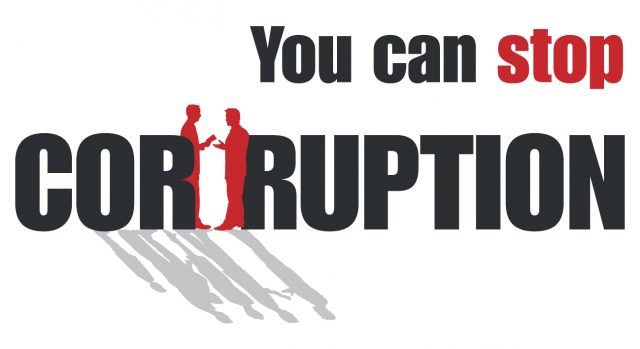According to the dictionary, the word corruption has many meanings including bribery or dishonesty. For most laymen corruption means taking or asking bribes. But from the legal perspective, corruption is defined as a fraudulent conduct of someone in power. It involves a wide range of misconducts, fraudulences, cheating, unscrupulousness and wrongdoings like embezzlement or siphoning of funds, misuse of government facilities and office power abuse. Some might even regard “nepotism’ as a form of corruption since it involves appointment of relatives regardless of merit.
Myanmar, we all know, has a wonderful culture. Paying respects to our elders and teachers stands as a beautiful custom or part of our tradition that cannot be found elsewhere in the world. We pay obeisance to them with all sorts of things both in cash and kind; sometimes even with basketful of stuff for use at “Thi-din-gyut’ and on some special occasions.
That’s definitely not bribery.
Back in the past, we had a senior lecturer, a Thai Lady who, after getting married to a Myanmar prosecutor, stayed in Myanmar and joined our teaching staff in the department. Every vacation time, she went back to Bangkok to visit her relatives. On her return she always brought back mall gift-stuff like lipsticks, powder cases, perfume bottles, scarfs, etc for all the staff in the department. Everybody got one present and we were very happy with our shares.
She used to tell us that when one has a chance to go somewhere, one should remember those left behind, who don’t have a chance even.”
Her words got ingrained in my head and since then whenever I had a chance to visit a place local or abroad for any reason, I always tried to bring back little stuffs to give as presents to those around me.
Those are pure gifts given out of sheer love and compassion. Other than that, any gifts either in cash or kind, given to a person in position of power or authority by someone with the objective of influencing him to give undue advantage, favour or privilege of any kind should be deemed as bribes.
Some people would like to fix a value, an amount or a price to the stuff given in question as presents or gifts. For instance if the total value of the gifts doesn’t exceed a set amount or value, can be regarded as just gifts and not bribes.
But everybody knows that the dividing line between a gift and a bribe is very thin. It stands to reason that perhaps there’s no free lunch in this world after all. Therefore it is extremely advisable not to accept any gifts or presents particularly those coming from subordinates or business people who come into contact in the line of your work.
In olden days, there was a time when bribery and corruption fell under close watch. We have heard of the common saying: “Corruption, though can never be eliminated, can be minimized. The corrupt, regardless of where they are, find devious ways to corrupt the system”.
That seems completely true. Despite strict regulations and close watch, so-called unheard-of bribery cases began to take shape everywhere throughout the country. Particularly around the revenue-earning Ministries, people started to talk about the burden whether put intentionally or unintentionally, upon the subordinates in lower levels by the frequent invitations to parties like birthdays, anniversaries, etc. of the household members of the persons in high positions in the echelon. We can just imagine the expectation behind all those invitations; of course, nobody would come to a party with bare hands. It is quite understandable that those elites and business people would bring expensive gifts on such occasion, as a camouflage for their bribes which cover all sorts of valuable stuff from T.V refrigerator, silk clothes to even apartment and automobile key. I think that’s where the corrupts’ notion of “the smaller the packet, the better it will be,”finds its root.
That’s also the time, when we first heard of the biscuit tins with money stashed-in, given as normal acceptable gifts.
As is true with a weak governing system, the fight against bribery and corruptions gradually become lax with the consequence of open give-and-take cases.Left unattended nor thrashed down, corruption finds smooth paths across the society as a whole, “eating up the entire nation from within.” With “everyone’s doing it” notion, it seeps into the working of the government as well as the hearts of the people.
If we really want to eliminate corruptions and briberies, we need to exercise strict monitoring at all times with severe actions taken when found guilty. These days corruptions got ram pant particularly among the government employees. If we look closely, we will find that corruption begets still more corruption with the cycle non-stop-going-on and generating a whole new breed of people called touts, contact men and go-betweens. All these people thrive on victimizing and extortion.
We must make war on corruption a ‘national priority’. Vichien Phongsathorn, the chairman of the graft watchdog in Thailand has stated that “Graft hurts nation’s progress’, affecting the country’s development sustainability as well as the stability of the government.
His graft combatting proposals seemed quite impressive and practicable anywhere. First of all, it pressed that government policies must include more tangible measures to combat corruption and promote good governance. Then it includes giving the civil sector a more participatory role in fighting corruption and the disclosure of information relating to state procurement projects and the exercise of power by the state actors to ensure transparency in their dealings.
One attracting point suggested is to keep all government employees on a tight leash to prevent any corruption on their part particularly those in high positions and power.
The proposal also called for continuity in enforcing compliance with legislation and regulations designed to prevent graft, such as the law on state procurement, integrity pacts, and reducing red tape to reduce bribery opportunities in the state sector and beyond.
Human nature is such that the bribers are always there, finding ways and means or ‘the path’ for bribing ready to solicit for undue favours and privileges.
Now is the time for all citizens to reaffirm their commitment to stamping out corruptions and briberies. Channels have been opened for people to be able to send in reports and com plaints. With the unprecedented moves from the government to get rid of corruptions by calling for help from the citizens, we should not be reluctant in fulfilling our civic duties to report in case any lead to corruption happens to be in the know.
If a bribery and corruption case is ever uncovered, and if any are found guilty, they must be punished properly and immediately removed from their positions. Nobody should be above the law. That way our youth can also take lessons to feels shy and to be afraid of doing evil things and completely shun away from corruption by all means.
Let me conclude my essay with the note worthy words of former Indian Prime Minister, A.P.J. Abdul Khalam:
It’s our nation, our people and service; whose duty is it, to uproot the weeds? why not you? why not me? if not you and me, who?
And better still, let it be – ‘We’










